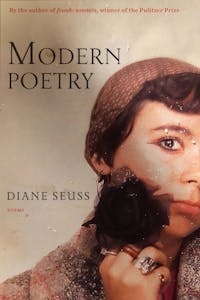Modern Poetry
Poems
 Download image
Download image
ISBN10: 1644452758
ISBN13: 9781644452752
Hardcover
112 Pages
$26.00
CA$35.00
Diane Seuss’s signature voice—audacious in its honesty, virtuosic in its artistry, outsider in its attitude—has become one of the most original in contemporary poetry. Her latest collection takes its title, Modern Poetry, from the first textbook Seuss encountered as a child and the first poetry course she took in college, as an enrapt but ill-equipped student, one who felt poetry was beyond her reach. Many of the poems make use of the forms and terms of musical and poetic craft—ballad, fugue, aria, refrain, coda—and contend with the works of writers overrepresented in textbooks and anthologies and those too often underrepresented. Seuss provides a moving account of her picaresque years and their uncertainties, and in the process, she enters the realm between Modernism and Romanticism, between romance and objectivity, with Keats as ghost, lover, and interlocutor.
In poems of rangy curiosity, sharp humor, and illuminating self-scrutiny, Modern Poetry investigates our time’s deep isolation and divisiveness and asks: What can poetry be now? Do poems still have the capacity to mean? “It seems wrong / to curl now within the confines / of a poem,” Seuss writes. “You can’t hide / from what you made / inside what you made.” What she finds there, finally, is a surprising but unmistakable love.
Reviews
Praise for Modern Poetry
“Modern Poetry is filled with such agility, as Seuss’s finely tuned lyricism counterpoints in stunning ways her almost bathetic directness. At no point does this collection about poetry feel insular or solipsistic; rather, it leaps from the page with great urgency, in no small part because of the charm and affability of Seuss’s speaker . . . She is someone to who one wants to listen.”—Preposition Magazine
"If the capacious version of the sonnet that Seuss used in her previous collection, the award-winning frank, proved a gorgeous way to rein in—structure, organize, make into art—the enthrallingly candid rovings of her mind, her new book takes the canon itself as inspiration, or perhaps a copy of an old poetry anthology left in a puddle, adapting its forms to her special subject matter, the poet who somehow sprang from the mud of a non-literary or even anti-literary background."—David Woo, Literary Hub
"These irreverent, pulsing, and defiant poems are full of dangerous good sense."—Publishers Weekly (starred review)

